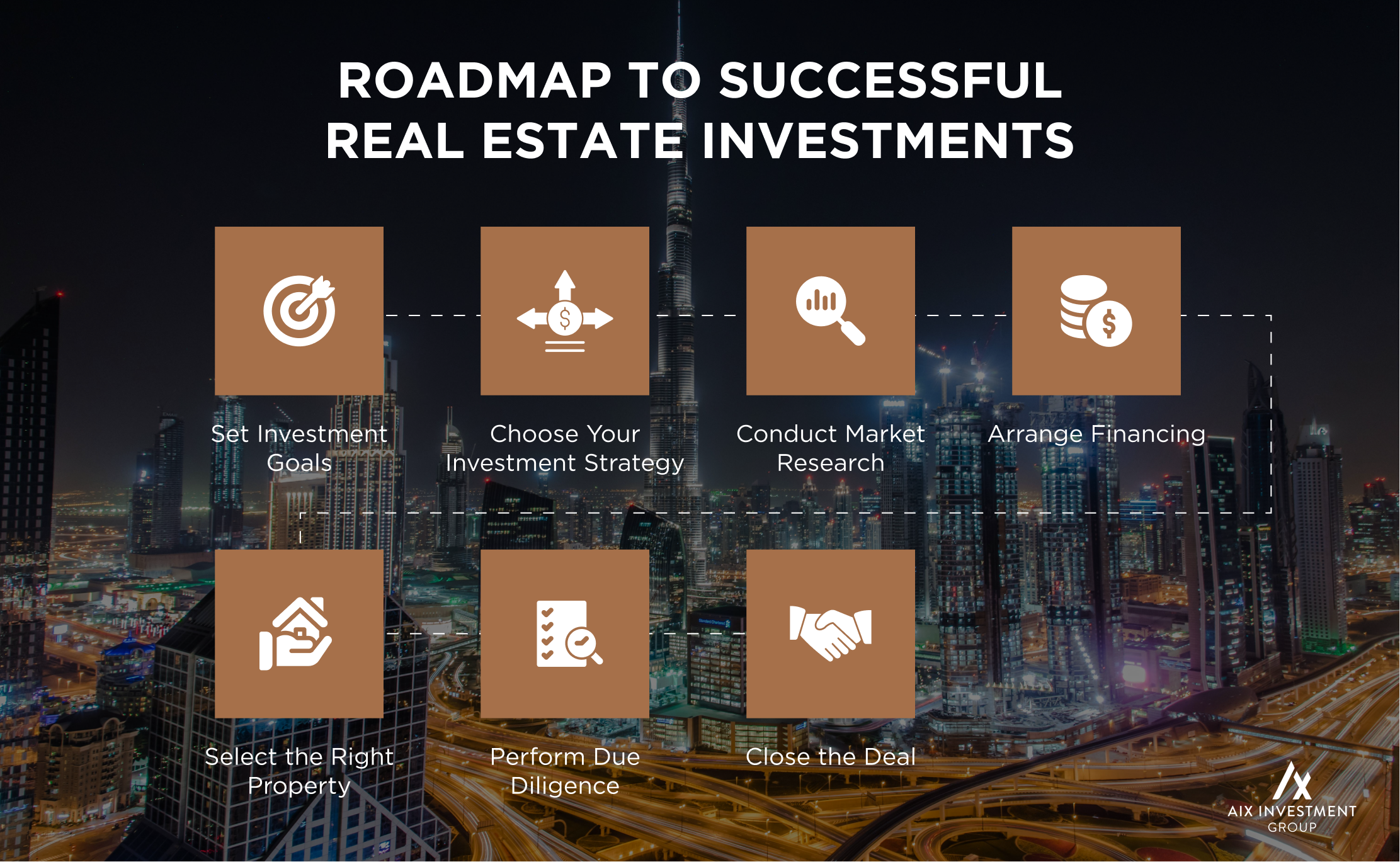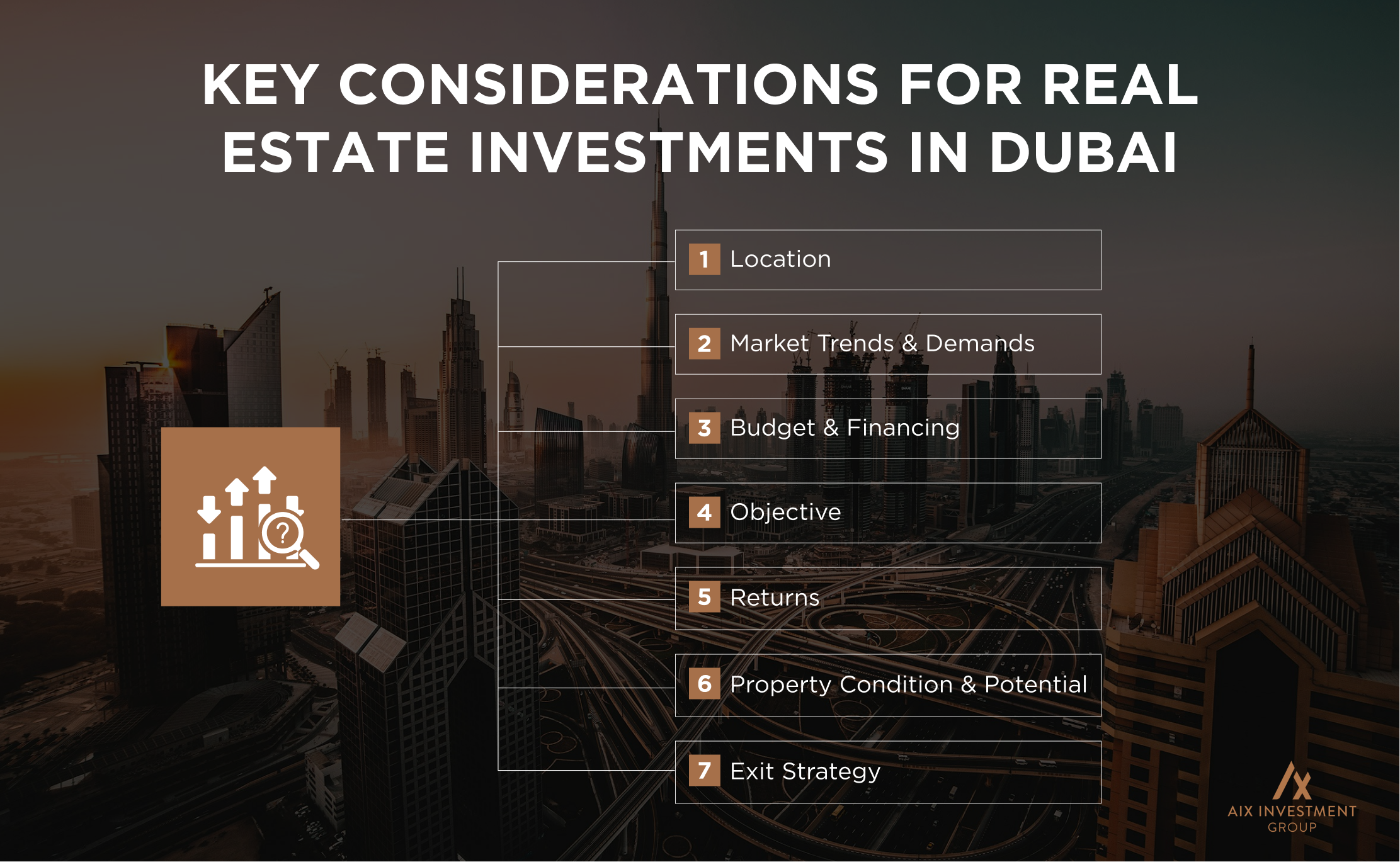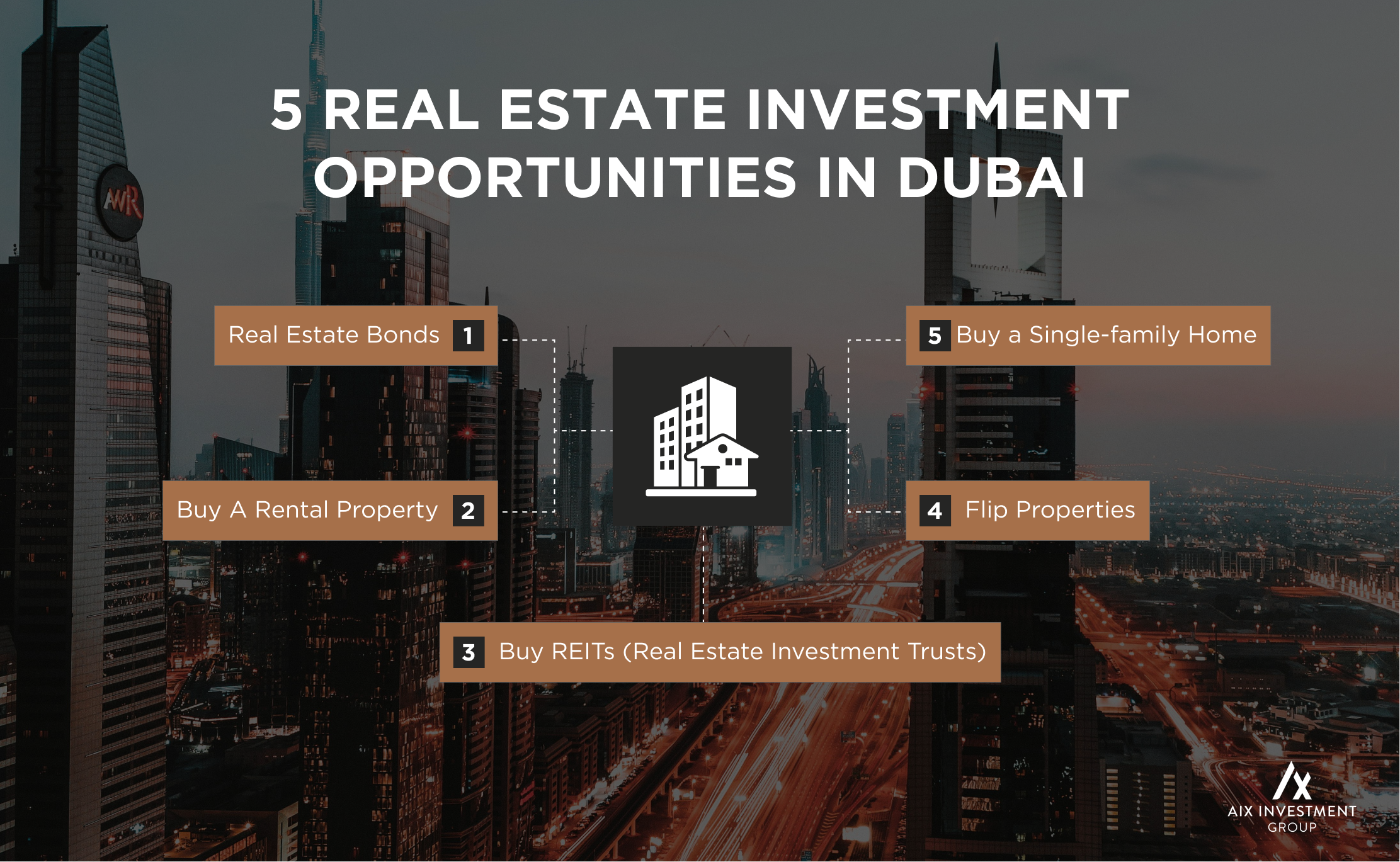
If there is one investment option that has always been stable and reliable globally, it is real estate.
Despite recent economic downturns, Dubai has consistently offered many opportunities for beginners to enter the real estate market, achieve above-average returns, and diversify their investment portfolios.
Some experts suggest that, when done appropriately, real estate investing can be the highest-earning asset class in a portfolio.
This article will provide a comprehensive step-by-step guide on how to invest in real estate in 2025, while highlighting the key factors to consider. We’ll also share five expert-recommended strategies beginners can use to enter the real estate market.

Every investment decision should start with a clear goal. With the promising real estate market globally,the right goal can help guide your strategy and maximize returns. Ask questions about the purpose behind your investment and define them.
Are you looking to generate rental income from your investment property? Or do you aim to benefit from the potential appreciation of property values over time?
Make sure they also follow SMART (Specific, Measurable, Achievable, Realistic, and Time Bound) principles and provide a clear roadmap on how to invest in Dubai real estate in the most reliable ways.
Selecting the right investment strategy is crucial as it directly impacts your potential returns, vulnerability, and overall experience in the Dubai real estate market. Make sure your strategy aligns with the goals defined and your risk tolerance.
Once you have decided on a strategy, analyze the market trends, conditions, demand, and property value. Take into consideration factors such as neighborhood growth, valuations, economic indicators, and future development plans to make informed decisions about the best ways to invest in real estate.
Have a foolproof financing plan to support your investment decisions. Start by understanding your budget and what you can afford. Then, narrow down how to fund your investment. Common options include traditional mortgages, private loans, and cash purchases. Consider the terms and interest rates, and make sure the financial plan aligns with your budget, strategy, and timeline.

The return on your property investment depends on the right choice. Factors such as location, condition, valuations, potential for appreciation, and rental income all play a crucial role in maximizing your investment potential. Take the time to carefully view and assess properties based on your investment objectives.
A regulatory background check is a key step that should not be overlooked when you decide how to invest in real estate. Make sure to investigate the property and its legal status before making a purchase. Review title deeds, zoning laws, property inspections, and financial records. This goes a long way in ensuring transparency with pricing, and there are no costly surprises down the line.
Finalize the purchase by signing relevant contracts and completing all legalities. Confirm there is no room for sensitive errors and that you comply with all local regulations, depending on the nature of the real estate investment in Dubai.

Location
The concept of real estate investing for beginners and making wise choices has a lot to do with the right location. In fact, location is everything in Dubai real estate investment, as it has a direct impact on maximizing returns and property valuation.
Check for proximity to essential amenities, transportation hubs, schools, and job centres. Research the neighborhood, its future potential, and prospects to ensure they stand the test of time.
Notably, areas with relaxed zoning regulations, high-quality infrastructure, and social amenities are likely to be characterized as high investment returns in Dubai’s real estate markets.
Market Trends and Demands
Understanding how to invest in Dubai real estate should always be analyzed with a proper view of market trends and demands. A good market can maximize return potential, whereas an oversaturated one can reduce reliability with longer holding periods.
Once you have chosen a neighborhood, check the demand for specific property types. This insight allows you to invest in options that align with current and future market preferences
Budget and Financing
Real estate investing for beginners involves many uncertainties and doubts. Proper budgeting and financing are crucial to keeping this journey as smooth as possible. Plan ahead on the cost you can allocate for your investment.
Find out how you plan to finance it and have a clear breakdown of payment strategies for the defined investment period. It is also highly recommended to pay off all debts before committing to an investment, as this can hinder financial flexibility and reduce the potential to maximize returns.
Objective
Real estate in Dubai is highly attractive to both local and international investors. It is a versatile market with many opportunities for anyone willing to study, explore, and master it.
However, the key here is to have a clear objective that serves as the foundation to guide your choices. Do you want the property for self-use, buy and lease, or short or long-term objectives?
Asking yourself these questions helps you narrow down options and decide on the best ways to invest in real estate.
Returns
The only way to determine the profitability of your real estate investment is to understand the return ratio with risk tolerance and financial goals.
Strong return potential, whether through rental income, property appreciation, or both, is crucial to guarantee that your investment strategy generates long-term gains.
The returns could be periodic, for instance, on a monthly basis through rental income, or in full once a project is completed for a property built from the ground up and then sold.
Evaluating the projected returns of your investment decision also helps you understand cash flow, overall growth, and the success of your investment strategy.
Property Condition and Potential
Another crucial factor to consider when real estate investing as a beginner is to see the condition and future potential of the property. This includes thoroughly assessing the structural integrity, maintenance requirements, renovations needed, and the capacity for value-adding improvements
Exit Strategy
A successful real estate investment plan in Dubai should always include a clear exit strategy that aligns with your financial goals and level of risk tolerance.
Common exit options for developers include:
There are two standard options when it comes to real estate investment: (1) Off-plan and (2) ready-to-move-in. Off-plan properties are still under construction or yet to be scheduled for turnover. On the other hand, ready-to-move-in properties are those that are already completed and can be used immediately.
Here are the benefits and limitations of each option.
Freehold properties give you full ownership and legal right to use, lease, or sell the property. Simply put, the buyer has complete control and rights over the property.
In contrast, leasehold properties do not provide full ownership. Instead, leaseholders are only given ownership for a set period, typically 99 years. The duration may be extended or shortened, after which ownership reverts to the freeholder.
A residency option available to non-residents who invest in Dubai’s real estate market. To qualify for an investment visa, your property must meet the following conditions:
Note: The minimum investment thresholds are higher for many visa types now. There is a visa category for AED 750,000 property Investment, but that gives a shorter residency period (2‑3 years in many cases) rather than the full Golden Visa.
For spouses as joint owners: Allowed, provided each investor contributes at least AED 1 million.
For non-spousal joint ownership: The individual share of the jointly owned property must be worth AED 2 million or more.

Real estate bonds are a type of loan that provides funds for a borrowing account, often involving a government or corporate body. Basically, bonds are documents that serve as proof of a loan between an investor and a corporation or government entity.
In a bond agreement, the investor gives the corporation or a government body a certain amount of money for a predefined period. In return, the investor, who is the lender, gets a periodic interest payment (outside the capital lent).
Once the agreed-upon time frame expires, the investor receives the capital or total amount paid from the borrower (corporation or government).
Real estate bonds work the same way. However, in this case, these bonds are backed by real property, commercial mortgages, or other real property debt. When you invest in real estate bonds, you lend out money to those related to real estate through REITs, exchange-traded funds, and real estate crowdfunding platforms.
The key advantages of investing in real estate bonds include, but are not limited to, the following:
Fixed Income
As real estate bonds offer a fixed interest rate, they provide investors with the reliability of a steady income stream. This feature is particularly appealing to income-oriented individuals and retirees seeking a dependable source of passive income.
Principal Preservation
Unlike stocks and many other types of investment opportunities, bonds don’t fluctuate in value much. This means that the investors typically receive the same face value after maturity, which helps with capital preservation, assuming the issuer does not default.
Inflation Hedge
Real estate is considered a hedge against inflation. Although this hedge is not as direct as owning physical real estate, it offers a promising level of resistance against inflation.
Capital Appreciation
Depending on the market conditions and the terms of the bonds, there is sometimes potential for capital appreciation. This often happens when the demand for a bond increases in the market.
Lower Volatility
Compared to stocks, bonds in general, including real estate bonds, exhibit lower volatility. These features make real estate bonds the best option for conservative investors.
Diversification Benefit
Unlike stocks and other types of bonds that are tied to industries, real estate bonds perform differently, which increases their ability to reduce the overall portfolio risk.
If you want to invest in Dubai real estate quickly and with relatively low capital, Real Estate Investment Trusts (REITs) are a strong option to consider.
Much like mutual funds, REITs are issued by public companies to raise capital by selling shares of stock and issuing bonds. The funds are then used to purchase and lease properties, including offices, retail spaces, shopping malls, warehouses, apartments, and hotels.
A major advantage of REITs is their high dividend yields, making them popular for retirement planning. If you’re not looking for another regular income stream, you can reinvest these dividends to grow your portfolio further. Unlike direct ownership, REITs eliminate the need to manage properties yourself, as the company handles all operations, allowing you to simply invest and collect returns that are usually higher than stock-based investments.
It is important to note that your risk level depends on the type of REIT. Non-traded REITs can be quite challenging to sell and might be hard to value. For this reason, beginners are generally advised to invest in publicly traded REITs, which can be bought through brokerage firms and accounts, making them more liquid and transparent.
For broader diversification of investments in Dubai, consider real estate ETFs or mutual funds that hold multiple REITs, spreading exposure across various property sectors.

Contrary to popular belief, investing in Dubai real estate doesn’t always mean buying rental properties to maximize profits. Flipping properties is an alternative strategy that involves purchasing a discounted property, renovating it, and selling it for a profit or at a higher price. The key is to select properties in promising locations, as this can generate quicker returns compared to managing long-term rental investments.
To become a successful property flipper, you need:
Keep in mind that the sooner you sell, the less you’ll spend on holding costs like mortgages, utilities, and insurance.
Risks to Consider
House flipping can carry a higher risk if the property requires extensive renovations and permits. Unexpected expenses, especially when hiring contractors, can quickly cut into profits.
Expert Tip:
To reduce costs and effort, focus on properties that need only minor repairs. Another effective approach is to rent the property temporarily while waiting for its value to rise before selling. Most importantly, learn to identify attractive neighborhoods that will allow you to sell at a premium.
If you’re ready to make a significant investment in Dubai’s real estate market, buying rental properties remains one of the most reliable strategies. The main advantage is the potential for steady cash flow through rental income, along with the opportunity for the property to appreciate in value over time, especially in high-demand locations.
Landlords can also deduct many of the costs associated with property management, such as maintenance, repairs, insurance premiums, utilities, mortgage interest, administrative fees, and depreciation.
There are two main ways to make money with rental properties.
These are properties you can rent for at least a year or longer. It ensures a steady cash flow, provided the tenants are reliable. This option can work for both single-family homes and multi-unit properties, depending on your investment goals.
Caters to tenants staying for days or weeks, such as through platforms like Airbnb. Investors can either list their own home while away or purchase a dedicated property for short-term leasing.
Challenges with short-term rentals:
Hiring a property management company can help reduce the workload, but it also lowers your rental profit margins.

Investing in a single-family home is one of the safest and most accessible options for those looking to invest in Dubai real estate in 2025. Backed by strong housing growth, high rental demand, and favourable financing, this option appeals to families and professionals seeking affordable, private housing in suburban communities.
Rental yields for single-family homes remain resilient in Dubai due to a growing population and consistent tenant demand. These properties are generally easier to manage and maintain than multifamily units, making them attractive for new investors.
Banks in the UAE often classify single-family homes as low-risk assets, offering flexible mortgages at competitive interest rates. Investors can finance up to 50% of the property value, making this option particularly appealing to first-time buyers.
Single-family homes tend to retain their value and appreciate steadily over time, promising reliable long-term returns. Their straightforward nature and flexible lease terms make them an ideal entry point for investors with limited experience who want manageable risk and consistent returns.

Buying a villa in Dubai can be a profitable investment mainly due to the city’s stable economy and the real estate market backed up by higher rental income, demand, and investor-friendly policies. These factors make purchasing a villa in Dubai a perfect option for those looking for long-term financial benefits.
The United Arab Emirates, particularly Dubai, has consistently upheld its reputation as the best country to buy property, and it continues to hold that position this year. Other frequently highlighted countries include Turkey, Portugal, Spain, Greece, Malta, and Cyprus.
The minimum price to buy or invest in Dubai real estate can range anywhere from AED 600K to 900K. Still, it depends on many factors such as location, property type, freehold vs leasehold, off-plan vs ready property, developer reputation, amenities and facilities, view and floor level, payment plan, and financing options.
The cost of a 2-year property investor visa in Dubai varies depending on documentation and processes. A key government fee is approximately AED 10,212.50, though additional charges may apply. For the latest updates, it’s best to check directly with Dubai Land Department.
Both options for real estate investment in Dubai have pros and cons. However, although they require a higher initial investment than apartments, villas have a significant potential for capital appreciation. As standalone properties, they often see better price growth over time, particularly in places undergoing rapid development.
Yes, you can own 100% of a property in Dubai, but it’s limited to designated freehold areas. In these zones, foreign investors are allowed full ownership of properties, including the right to sell, lease, or occupy them. However, outside these freehold zones, foreign ownership is restricted, and different regulations may apply.
At AIX, our team of handpicked financial advisors and real estate experts is here to guide you through the complexities of real estate investing as a beginner. Given the dynamic landscape of the Dubai real estate market and its versatile options, making a decision requires careful planning and execution.
All our financial advisory services are tailored to your individual goals, risk tolerance, and budget. If you’re considering investing in real estate in 2025 and want expert guidance, AIX is here to support you every step of the way.
You can reach out to us at +971 56 732 7222 or fill out our inquiry form, and we will get back to you at our earliest convenience.
Overview